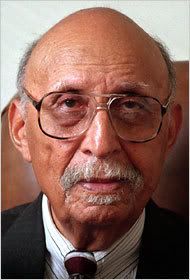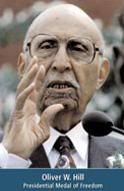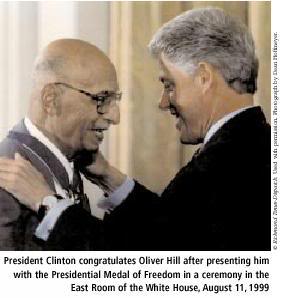Oliver W. Hill Sr.: 1907-2007 1,200 pay their respects Sunday, Aug 12, 2007 - 12:09 AM Updated: 01:00 AM
By JOE MACENKA
TIMES-DISPATCH STAFF WRITER
 Pallbearers lift the casket of famed civil-rights attorney
Pallbearers lift the casket of famed civil-rights attorney
Oliver Hill, Sr. up the steps of the Executive Mansion
to lie in state for public viewing Saturday.
Photo By: JOE MAHONEYThe body of Oliver W. Hill Sr. was brought to the Executive Mansion yesterday so Virginians could bid farewell to the civil-rights champion.
For seven hours, they filed into a sun-splashed parlor on the first floor of the governor's residence to pay their respects to Hill, who was 100 when he died Aug. 5.
The procession included a five-hour viewing for members of the public, drawing young and old alike to see Hill and thank his family for the contributions of the lawyer with a tireless resolve to fight for equality.
(snip)
"For two-thirds of his life, Mr. Hill was basically fighting up against a civil society that wanted him to lose rather than to win," Kaine said. "But in the last third of his life, people realized that he was right. So the bar associations that kept him out as members gave him awards. And universities that had kept him out started naming scholarships after him."
And when Hill passed away, Kaine said, having him lie in state at the Executive Mansion was an easy decision. The last person to lie in state at the residence was Arthur Ashe; before him, it was Stonewall Jackson.
"I can't think of anybody who's had more of an impact on Virginia life the last 100 years than Mr. Hill," Kaine said. "He really believed what the Declaration of Independence said: that all people are created equal."
(snip)
Inscribed on the inner liner of the casket's lid were Hill's name, his year of birth, his year of death and the following: "May the work I've done speak for me."
http://www.inrich.com/cva/ric/news/state.apx.-content-articles-RTD-2007-08-12-0255.html A life remembered Sunday, Aug 12, 2007 - 03:18 PM Updated: 06:10 PM
 Gov. Timothy Kaine delivers the eulogy for famed
Gov. Timothy Kaine delivers the eulogy for famed
civil-rights attorney Oliver W. Hill Sr. during a service
at The Greatrer Richmond Convention Center.
Hill died last week at 100 years old.
Photo By: JOE MAHONEYAn array of Virginians and others gathered today to recall and celebrate the life of Oliver W. Hill Sr., the legendary Richmond civil-rights lawyer who was 100 when he died Aug. 5.
The funeral was held at the Greater Richmond Convention Center.
In remarks he prepared, Gov. Timothy M. Kaine wrote of the poetic justice that a Virginia governor was delivering Hill's eulogy, since Hill often confronted the state's political establishment during his legal battles to bring equal treatment to all Virginia's citizens.
Kaine said that if someone had told Hill decades ago that after his death he would "lie in state at the Governor's Mansion and be eulogized by the Virginia Governor," Hill would have laughed at the sheer outlandishness of that statement.
"I can almost hear him now," Kaine wrote. "In fact, he probably would then have said something like 'I've known many Governors who would have been very pleased to attend my funeral--and the sooner the better.'"
Here is what some of the others gathered for the service said.
"I know I would not be here today without Mr. Hill and his fight. ... Every elected African-American official, his legacy lives on in us. Every African-American student, his legacy lives on in us."
-- Delegate Jennifer McClellan, D-Richmond.
"The most important thing he did was eliminate legal white superiority..... one of the most committed, tenacious, courageous warriors in that struggle....He was a legal warrior. That's the only way you can describe him."
-- A. Peter Bailey, a Washington-based journalist and author and a former Richmond resident.
"I really am here to thank Mr. Hill for what he did specifically for my family."
-- Knox Tull Jr. of Washington, a civil engineer with the firm of Jackson and Tull. Tull was born and raised in Hampton in the 1950s, and Hill was among the lawyers who saved his father's job by representing him in a lawsuit against an employer.
I am at the funeral "to pay homage to a true pioneer."
-- Reggie Walston of Richmond.
"I was taught facts about him through elders, teachers, professors. I just felt the need to be part of a history-making event and pay my respect and gratitude."
-- Michelle Gray Smith, 40, of Richmond, a VCU Medical Center nurse.
"He leaves a good legacy for the young people in terms of trying to do right, be a leader to society."
-- Everett Kelly, 45, of Richmond, a cook.
"He stood for so much. He shows that you can overcome obstacles, no matter what,"
-- Veda Florence-Hawkes, 47, of Richmond who brought her daughter, Tiffany, and 2-year-old granddaughter, MaKayla.
"Our young people need to know him. He was willing to take a stand for what he believed in, even though the odds were against him."
-- The Rev. Grace Toliver of Greater Brook Road Baptist Church
http://www.inrich.com/cva/ric/news.apx.-content-articles-RTD-2007-08-12-0323.html Oliver W. Hill
A life of service to Virginia -- and AmericaTuesday, August 7, 2007; Page A12
VIRGINIA AND the United States lost a forceful foot soldier in the march to make America true to its ideals when Oliver W. Hill died Sunday. The 100-year-old native of Richmond found his calling after inheriting a copy of the Constitution from an uncle. He went on to follow that enduring road map of freedom as he sought to right the wrongs of segregation. As Gov. Timothy M. Kaine said Sunday, "His life's work was predicated on the simple truth that all men and women truly are created equal."
Mr. Hill was born May 1, 1907, in Richmond, but he was raised here in the District. He graduated from Dunbar High School and earned a bachelor's degree and a law degree at Howard University. Thurgood Marshall, who would later be the first African American appointed to the Supreme Court, was a classmate, colleague and friend. Mr. Hill went back to Richmond and became the first black person elected to the City Council since 1898. But it was the gnawing unfairness of the court's 1896 decision in Plessy v. Ferguson, which upheld separate but equal public facilities as constitutional, that fed Mr. Hill's passion for using the law to correct injustice.
Mr. Hill was the lead lawyer in D avis v. County School Board of Prince Edward County, Va., which challenged "separate but equal" as applied to public schools. Yearning for a roof that didn't leak and a better learning environment helped change America; Davis was one of five cases that the Supreme Court combined in 1954 when it ruled, in its landmark Brown v. Board of Education decision, that segregation in the public schools was unconstitutional. Mr. Hill's legacy as a Virginia lawyer is a raft of lawsuits that expanded everything from voting rights to employment protections. Like so many in the civil rights movement, he endured threats to his safety and to his family. And like so many in the civil rights movement, Mr. Hill was undeterred.
President John F. Kennedy invited Mr. Hill to serve at the Federal Housing Administration as an assistant commissioner in 1961. President Bill Clinton called him to the White House in 1999 to bestow upon him the nation's highest civilian honor -- the Presidential Medal of Freedom. Now comes one last series of honors. Mr. Kaine has ordered flags across the commonwealth lowered to half-staff, Mr. Hill will lie in state at the governor's mansion on Saturday, and his life will be celebrated at a memorial service on Sunday. Both the viewing and the service will be open to the public -- appropriate for someone who shaped history in the most admirable way.
http://www.washingtonpost.com/wp-dyn/content/article/2007/08/06/AR2007080601438.html Oliver W. Hill, 100, Civil Rights Lawyer, Is Dead By THE ASSOCIATED PRESS
Published: August 6, 2007
 Oliver W. Hill in 1999
Oliver W. Hill in 1999 RICHMOND, Va., Aug. 5 (AP) � Oliver W. Hill, a civil rights lawyer who was at the forefront of the legal effort that desegregated public schools, died Sunday at his home here. He was 100.
Mr. Hill�s death was reported by a family friend, Joseph Morrissey.
In 1954, Mr. Hill was involved in the series of lawsuits against racially segregated public schools that became the Supreme Court�s landmark Brown v. Board of Education decision.
�He was among the vanguard in seeking equal opportunity for all individuals, and he was steadfast in his commitment to effect change. He will be missed,� said L. Douglas Wilder, who in 1989 became the nation�s first elected black governor and was a confidant of Mr. Hill�s. Mr. Wilder is now the mayor of Richmond.
(snip)
Though blind and in a wheelchair in recent years, Mr. Hill remained active in social and civil rights causes and in the operations of his law firm until 1998. The next year, he received the Presidential Medal of Freedom, the nation�s highest civilian honor, from President Bill Clinton.
http://www.nytimes.com/2007/08/06/washington/06hill.html Presidential Medal of Freedom Recipient Oliver White Hill OLIVER WHITE HILL
OLIVER WHITE HILL By
William Jefferson Clinton
August 11, 1999
A courageous civil rights advocate, Oliver Hill has devoted his life to building a more just and inclusive America. As a trial lawyer, he won landmark cases that secured equal rights for African Americans in education, employment, housing, voting, and jury selection. Successfully litigating one of the school desegregation cases later decided by the Supreme Court in Brown v. Board of Education, he played a key role in overturning the �separate but equal� doctrine. For his unyielding efforts to improve the lives of his fellow Americans and his unwavering dedication to justice for all, our Nation honors Oliver Hill.
 Biography
Biography
OLIVER WHITE HILL: Liberator of Virginiaby
Dr. J. Clay Smith, Jr.
Professor of Law
When Oliver White Hill matriculated at Howard University School of Law, the world was dramatically different than it is today. And, yet, challenges remain to correct the imbalances of justice and equality all over the world. Oliver White Hill was born in Richmond, Virginia in 1907 under the shadow of Plessy v. Ferguson. This means that his parents were born under the shadow of the Dred Scott decision of 1857. Yet, he strived to make something out of himself, and he did.
Mr. Hill earned dual degrees at Howard University as an undergraduate and from the Law School in 1933. He brought with him the songs of the South in his soul, as did his classmates. No one could hear them sing, but their souls sang songs of liberation, and their hearts beat like the drums of their native land and their feet danced their way into the library headed by A. Mercer Daniel. With two Howard degrees under his belt, and the bar examination of the Commonwealth of Virginia behind him (1933), Mr. Hill set out to make the world a better place to live for all Americans.
Threats against his life made the task of making a better world to live in a daunting task. Mr. Hill's life teaches us more than history may uncover. His life teaches us how to live a life with dignity, purpose and resolve. We have much to learn still from Mr. Hill's life experiences. Fortunately, we can learn much from his recently published autobiography: The Big Bang: Brown v. Board of Education, The Autobiography of Oliver W. Hill, Sr. (2000), edited by Professor Jonathan K. Stubbs. The book reveals the life not of a man who is weak of heart but one strong in his desire to eradicate the inequities that limited the advancement of black people in the nation. Mr. White has taught us to combine legal forces and unite our strategies to overcome barriers to economic and social advancement.
Thus, it was with the skill of lawyers like Mr. Hill, not luck, that African Americans are freer today than they were in 1907, the year he was born. It was his superior legal skills and full commitment to make a difference, even in the face of death, that warrant tributes to Mr. Hill.
Mr. Hill instructs us to pay equal tribute to Spottswood William Robinson III, a former Dean of th Law School and another son of Virginia, and to Samuel Tucker his law partner, for their heroic work in Davis v. County School Board of Prince Edward County, one of the five school desegregation suits decided in the 1954 by the U.S. Supreme Court in Brown v. Board of Education.
The nation owes much to Oliver White Hill. He has given unselfishly the whole and entire of his professional life to secure the real values of the nation. T he law students present at this occasion will tell their children and grandchildren that during the Fall Semester 2000 they were in the presence of one of America's greatest patriots, one of its greatest lawyers, one of its noblest men, and one of Howard Law School's greatest sons.
Recently, the American Bar Association and William Jefferson Clinton, the President of the United States, presented Mr. Hill with medals acknowledging his exceptional achievements to the nation and the rule of law. Thus, he stands as tall in character and principle as other notable distinguished medal winners such as Justices Thurgood Marshall and Felix Frankfurter. These medals are mere symbols of Mr. Hill's human sacrifice for over sixty years to make the United States Constitution an inclusive instrument for all Americans.
In July, 2000, Mr. Hill received the American Bar Association Medal. In announcing the award, William G. Paul, the President of the ABA stated, �Oliver Hill has toiled for more than two generations to make equality and justice living realities for all the people of the United States.�
We thank Mr. Hill for the work that he has done for our freedom and for being the liberator of the Commonwealth of Virginia. On August 11, 1999, the President of the United States, William Jefferson Clinton, powerfully demonstrated the nation's gratitude to Oliver Hill when he presented him with the Presidential Medal of Freedom, the highest honor the nation can bestow on a citizen. Speaking eloquently of Oliver Hill's contribution to the nation, President Clinton stated:
Throughout his long and rich life, {Oliver White Hill} has challenged the laws of our land and the conscience of our country. He has stood up for everything that is necessary to make America truly one, indivisible and equal.
The songs of freedom that Oliver White Hill brought to Howard University School of Law still ring out of generations that have followed in Hill�s path. In this century, many more will follow.
http://www.medaloffreedom.com/OliverWhiteHill.htm